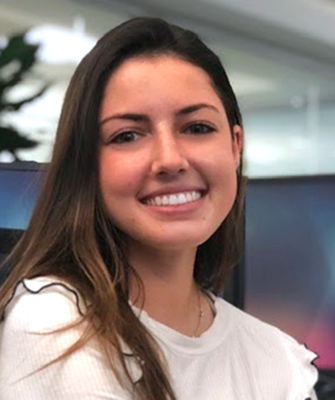 Menu
Menu

By Callie Ewing, BA ’03 MH ’22
Alexa Reubens’, MS ’22, journey from entry-level analyst at Citrix to its cybersecurity chief of staff was a challenging one for the self-described introvert.
Reubens started at the company as an intern, with no background in cyber, but was encouraged by her coworkers to feel comfortable asking questions and getting involved. Then, her joining the company as a full-fledged employee coincided with Citrix consolidating the information security teams, and Reubens became a scrum master to help manage this process. Not long after, Reubens found herself coordinating an intense cybersecurity incident response investigation.
“I had no choice, no time to be shy or scared,” she explained. “I was dealing with firefighting and communicating with leadership; shyness was a luxury incident response does not allow. But I also found my passion — when you really love something, you just want to talk about it all the time. Loving my job melted that icy shell because I was so on fire with excitement about what I do.”
Enrolling in UD’s Master of Science in Cybersecurity was key to furthering her cybersecurity career. She chose UD’s program out of many others because it does not focus just on cybersecurity but also covers related components, requiring classes in business, marketing and leadership as well.
“It’s an amazing program that is unique from other programs and really aligns with my goals,” she said. “I’m able to apply what I learn if not the very next day, then very soon thereafter. The curriculum is so tangible, and I think that having work experience I can relate more intimately because I’ve been living it. It’s relevant to conversations and challenges we’re having in the security industry today.”
Because she lives in Fort Lauderdale, Reubens takes classes fully online — an option she loves having — and only does one at a time in order to be able to balance school and her full-time job. She plans to finish her degree in about a year.
Being in UD’s M.S. program has also bolstered Reubens in her theory of empowered thermoelectricity, which she conceived as a sort of response to being a young female in a field that is not always hospitable to young females. “Thermoelectricity is when heat is converted into electricity. So the analogy here is: As women in cybersecurity, we often feel an additional level of heat — that is, the intensity to do extra well, or biases in the workplace,” she explained. “If this heat for a second starts to bring me down, I convert it to electricity — this is the motivation, the energy and the gratitude in knowing that I have the opportunity to break some stereotypes along the way.”
Recently, someone tried to explain a cyber concept to her when she had just taken a final on that exact concept and gotten an A.
“I politely helped them finish that thought,” she laughed. “ So my empowered thermoelectricity philosophy is about a mindset and a presence, how I’m presenting myself in the moment — am I going to let myself get intimidated, or am I going to show my strengths?
“The fact of being young and female in the technical field, for now,” she emphasized, “is that you have to turn pressure into energy. We will not be an anomaly forever. That’s the difference between getting stuck in your head, in doubt, and defying the odds.”
For other young women who might have an interest in this field, Reubens advises, “You have to understand the right balance of confidence and humility. You just have to get your foot in the door. In my case, I could not have set an expectation in advance — I just had to be willing to start somewhere. Be willing to say yes to the needs of the business even when you don’t know how to do everything, because cyber is always evolving, and no one knows everything you need to know. Someone with the right appetite, the energy to say yes, to be willing to learn — who still has the elasticity to learn, to try something new and fail — someone who wants to learn the security of 20 weeks from now — these are the people we need in this field.
“One important thing for students and people interested in security to know,” she added, “is that there is a lot more to do in cybersecurity than knowing how to code. Cybersecurity has a need for strategic thinkers, leaders, who can distill a complicated domain into language that impacts how regular people live their lives. We need leadership and strategic skills to make sense of all of this and need to balance the field a little more, and that’s why the education I’m getting at UD is so valuable.”
Reubens’ professors at UD have also appreciated her enthusiasm, dedication and contributions in class.
“Alexa is a great example of a University of Dallas student who understands the importance of being a continual learner while balancing personal life, work and a challenging graduate cybersecurity program of study,” said Associate Professor and Ellis Endowed Chair in Management Technology Sandra Blanke, Ph.D., CISSP, CRISC, director of both the Center for Cybersecurity Education and the Center for Cyber Intelligence Education, and Associate Professor of Cybersecurity Renita Murimi, Ph.D., CISSP. “Alexa’s positive attitude, energy, leadership and technical skills are recognized, rewarded and sought after in the field of cybersecurity. At the University of Dallas, we focus on these talents and provide opportunities for students to grow and develop in each of these areas. We are extremely proud of Alexa as a leader in this highly competitive technical field and as a successful graduate student!”